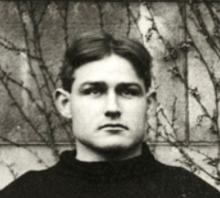Thomas Kelley (coach)
Thomas Kelley (born c. 1888) was an American football player and coach of football and basketball. He served as the head football coach at Muhlenberg College (1911–1913), the Missouri School of Mines and Metallurgy—now the Missouri University of Science and Technology (1914), the University of Alabama (1915–1917), the University of Idaho (1920–1921), and the University of Missouri (1922), compiling a career college football coaching record of 56–24–3 (.693). Kelley was also the head basketball coach at Muhlenberg from 1912 to 1914 and Alabama for the 1916–17 season, tallying a career college basketball record of 18–23 (.439). In addition, he served as the athletic director at Idaho from 1920 to 1922.
 | |
| Biographical details | |
|---|---|
| Born | c. 1888 |
| Playing career | |
| Football | |
| 1906, 1908–1909 | Chicago |
| Position(s) | Tackle |
| Coaching career (HC unless noted) | |
| Football | |
| 1911–1913 | Muhlenberg |
| 1914 | Missouri Mines |
| 1915–1917 | Alabama |
| 1919 | Missouri (assistant) |
| 1920–1921 | Idaho |
| 1922 | Missouri |
| Basketball | |
| 1912–1914 | Muhlenberg |
| 1916–1917 | Alabama |
| Administrative career (AD unless noted) | |
| 1915 | Alabama |
| 1920–1922 | Idaho |
| Head coaching record | |
| Overall | 56–24–3 (football) 18–23 (basketball) |
Playing career
Kelley played college football at the University of Chicago as a tackle for the Maroons under head coach Amos Alonzo Stagg.[1]
Coaching career
In 1915 at Alabama, Kelley coached only the first half of season (4–0) before he came down with typhoid fever. Athletic director B. L. Noojin and former Alabama quarterback Farley Moody took over the head coaching duties for the remaining four games of the season.[2] The 2–2 mark achieved in Kelly's absence is still credited to his record at Alabama of 17–7–1 (.700).
Kelley served in the U.S. Army in World War I and returned to coaching as an assistant at Missouri in 1919.[3] He moved west in 1920 and accepted the dual position of athletic director and head football coach at Idaho;[4] under his leadership the Vandals were admitted to the Pacific Coast Conference in 1922.[5][6] After two years in Moscow, Kelley accepted the position of head football coach at Missouri in June 1922 at a salary of $4,500 per year,[1] but resigned prior to the completion of his first season.[7]
Kelley also coached basketball for two seasons at Muhlenberg College (1912–1914) and for one season at Alabama (1916–17), tallying a career college basketball mark of 18–23.
Head coaching record
Football
| Year | Team | Overall | Conference | Standing | Bowl/playoffs | ||||
|---|---|---|---|---|---|---|---|---|---|
| Muhlenberg Mules (Independent) (1911–1913) | |||||||||
| 1911 | Muhlenberg | 5–4 | |||||||
| 1912 | Muhlenberg | 6–3 | |||||||
| 1913 | Muhlenberg | 6–2–1 | |||||||
| Muhlenberg: | 17–9–1 | ||||||||
| Missouri Mines Miners (Independent) (1914) | |||||||||
| 1914 | Missouri Mines | 9–0 | |||||||
| Missouri Mines: | 9–0 | ||||||||
| Alabama Crimson Tide (Southern Intercollegiate Athletic Association) (1915–1917) | |||||||||
| 1915 | Alabama | 6–2 | 4–1 | ||||||
| 1916 | Alabama | 6–3 | 4–3 | ||||||
| 1917 | Alabama | 5–2–1 | 3–1–1 | ||||||
| Alabama: | 17–7–1 | 10–5–1 | |||||||
| Idaho Vandals (Independent) (1920–1921) | |||||||||
| 1920 | Idaho | 4–2 | |||||||
| 1921 | Idaho | 4–3–1 | |||||||
| Idaho: | 8–5–1 | ||||||||
| Missouri Tigers (Missouri Valley Intercollegiate Athletic Association) (1922) | |||||||||
| 1922 | Missouri | 5–3 | 4–3 | 4th | |||||
| Missouri: | 5–3 | 4–3 | |||||||
| Total: | 56–24–3 | ||||||||
References
- "Kelley quits as Idaho coach; will go to U. of Missouri". Spokane Daily Chronicle. (Washington). June 8, 1922. p. 24.
- Groom 2000, p. 26.
- "Kelly to coach Missouri squad". Youngstown Vindicator. (Ohio). June 28, 1922. p. 8.
- "Football: 1920 season". Gem of the Mountains 1922, University of Idaho yearbook. April 1921. p. 108.
- "Conference to handle east-west games in future; Idaho admitted". Spokesman-Review. (Spokane, Washington). December 11, 1921. p. 1, sports.
- "Kelley quits as coach of Idaho". Spokesman-Review. (Spokane, Washington). June 9, 1922. p. 14.
- "Missouri coach has resigned position". Christian Science Monitor. November 16, 1922. p. 12. Retrieved April 22, 2012.
Sources
- Groom, Winston. The Crimson Tide – An Illustrated History. Tuscaloosa: The University of Alabama Press, 2000. ISBN 0-8173-1051-7-.